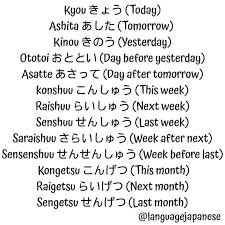| Posted on | others
How do you say last year in Japanese how is it used in a sentence
CONTENT WRITER | Posted on
The Japanese sentence for "last year" is "kagai nen." The word kagai means age, and ni means last. Therefore, a better translation would be, "the year before this one." As for how to say this in English, the phrase you are looking for is "the previous year." One way to say that in Japanese would be “shoha nen” which translates to mean old-year. You can use the word shoha instead of shuwa if you want to make it sound more like English.

0
0 Comment
Writer | Posted on
Are you interested in going to Japan? Wow, you have recent plans for a Japan tour! Great! But do you know how to speak or understand the Japanese language? Well, there are some essential topics without the knowledge of which you must not visit Japan. You must be able to say some basic sentences in the Japanese language. Among them, you have to know how to speak the dates and timing in the Japanese language. Well, it may be difficult to learn but not an impossible task at all.
Let us first discuss how to say last year in Japanese. Well, there are four different ways of speaking 'last year' in Japanese. They are:

Image source: Google
1. Many Japanese utter the word 'sakunen' which means last year.
2. Some say 'Kyonen' to mean last year.
3. Well, 'kyunen' is also widely used to mean the old year.
4. To make people understand the previous year, the Japanese say Zen'nen.
5. To mean anything related to old times, former times, a few years back, and last year.
These are the words for the English word 'last year' in Japanese that you can utilize in any Japanese sentence.
Now let us discuss how the Japanese translation for the days of the week:
1. In Japanese the Monday is said as getsuyobi.
2. Kayobi and Suiyobi are the Japanese translations of Tuesday and Wednesday respectively.
3. Are you aware of the Japanese translation of Thursday? Well, Mokuyobi is the Japanese version of Thursday.
4. Friday and Saturday are said as Kinyobi and Doyobi respectively in Japanese.
5. The translation of Sunday in Japanese is nichiyobi.
6. Like in English, all the names of the days end with the word 'days'. Similarly, in Japanese, there is a specific pattern to end the names of the week with the word 'yobi'.

Image Source: Google
Do you know what the people of the Japanese say today, yesterday, and tomorrow?
For the word 'today, Japanese people say 'Kyo'. 'Kino' is the Japanese translation of 'Yesterday'. While 'Ashita' is the Japanese translation of 'tomorrow'.
So we have tried to give you knowledge about some basic Japanese translations that can help you deal with Japanese people.
0
0 Comment
